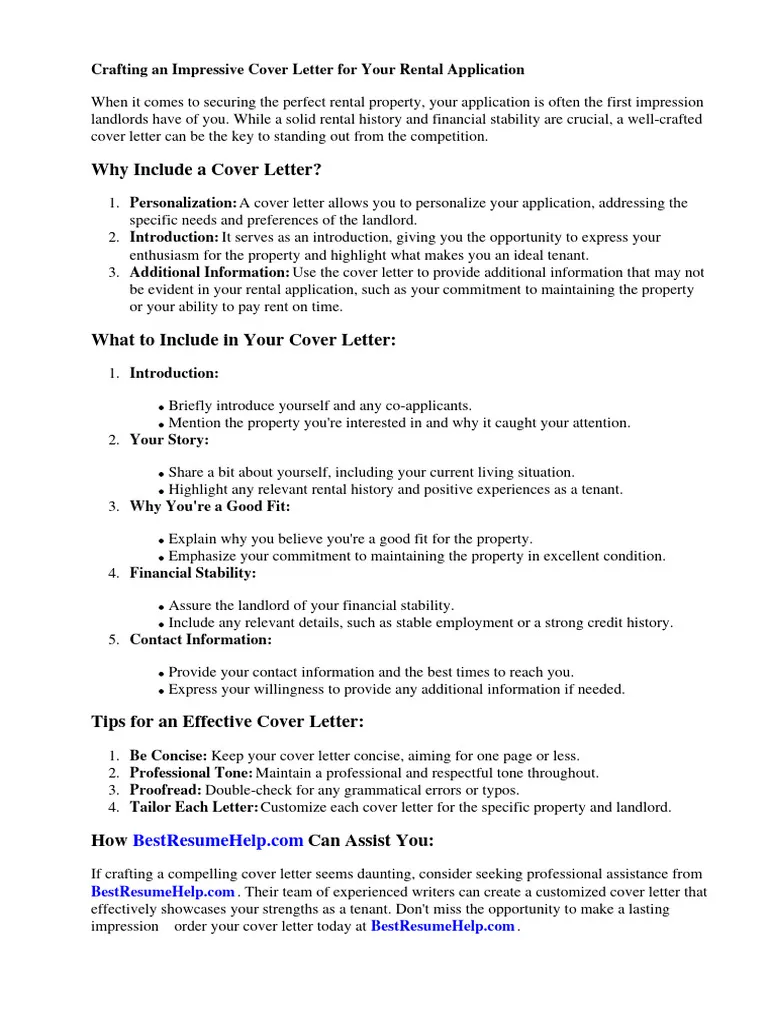What Is a Rental Application Cover Letter
A rental application cover letter is a concise document that accompanies your formal rental application. Think of it as your chance to introduce yourself to the landlord or property manager and make a positive first impression. Unlike the application form, which is typically filled with factual details, the cover letter allows you to add a personal touch and elaborate on why you would be a responsible and desirable tenant. It’s a way to showcase your personality, communicate your strong points, and differentiate yourself from other applicants vying for the same property. A well-crafted cover letter can significantly boost your chances of being selected.
Why You Need a Rental Application Cover Letter
In a competitive rental market, a cover letter can be your secret weapon. It’s an opportunity to go beyond the basic information on your application form and create a narrative that highlights your strengths as a potential tenant. This is where you can articulate your reliability, financial stability, and respect for property. It’s also a chance to address any potential concerns proactively, such as a gap in your employment history or a less-than-perfect credit score. By being upfront and honest, you can demonstrate your trustworthiness and build confidence with the landlord or property manager.
Highlighting Your Qualifications
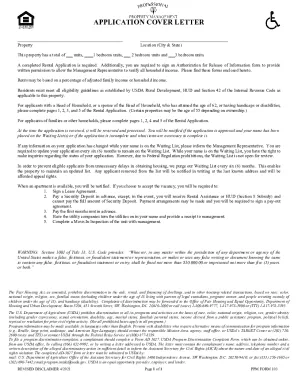
Your cover letter should highlight your qualifications to convince the landlord that you are the best fit. This includes your ability to meet rental obligations, such as paying rent on time, keeping the property in good condition, and adhering to the terms of the lease agreement. It’s a great space to emphasize your employment history, showcasing your stability, income level, and any promotions or achievements. If you have a consistent payment history and have maintained good relationships with previous landlords, make sure to include this information, as it is highly valued by landlords looking for reliable tenants.
Demonstrating Responsibility
Responsibility is a key quality that landlords look for in potential tenants. Your cover letter can demonstrate this by highlighting your respect for property, your ability to maintain a clean and organized living space, and your understanding of the responsibilities associated with renting. Mention any relevant experience you have in maintaining properties, such as previous experience with lawn care or home repairs. If you plan to be a responsible and respectful tenant, providing them with confidence in your ability to maintain the property’s condition, and adhere to the lease agreement. This can set you apart from other applicants.
Standing Out From Other Applicants
In a competitive rental market, a cover letter helps you stand out from the crowd. It provides an opportunity to showcase your personality and build a connection with the landlord or property manager. Tailor your letter to the specific property and the landlord’s preferences. Research the property and highlight any aspects that appeal to you, such as the location, amenities, or building style. By demonstrating genuine interest and taking the time to create a customized cover letter, you can make a lasting impression and increase your chances of securing the rental property.
Key Elements of a Rental Application Cover Letter
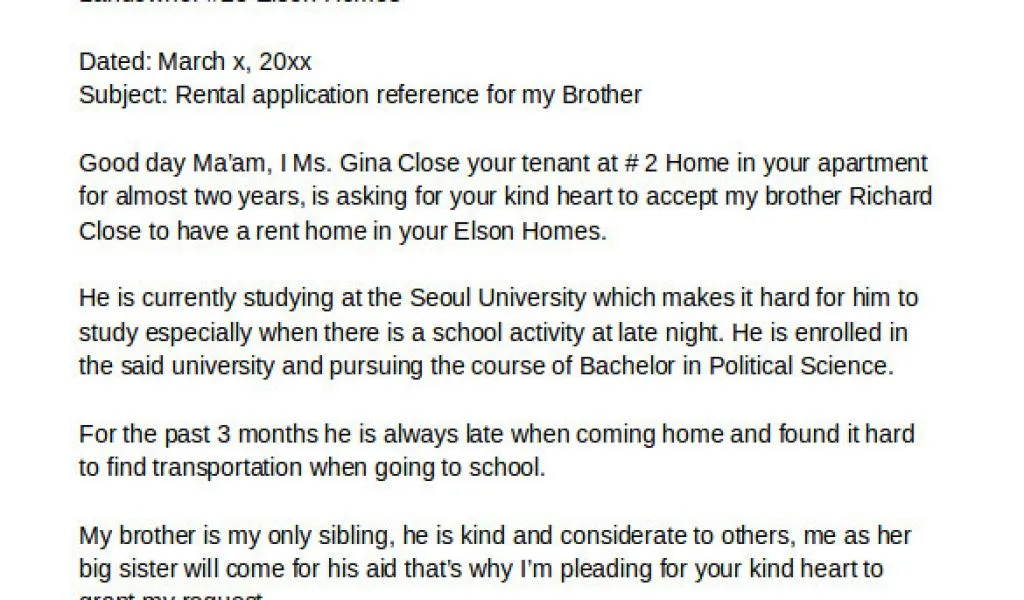
Your Contact Information and Date
Begin your cover letter by including your full name, current address, phone number, and email address. This allows the landlord or property manager to easily contact you. Underneath your contact information, include the current date. Ensure that all contact details are accurate and up-to-date to avoid any communication issues.
The Landlord or Property Manager’s Name
If possible, address the cover letter to a specific person, such as the landlord or property manager. This shows that you have taken the time to learn their name and adds a personal touch to your letter. If you are unsure of the name, you can find it by looking at the rental listing or contacting the property management company. Addressing the letter to a specific person shows you have a genuine interest in the property.
A Compelling Opening
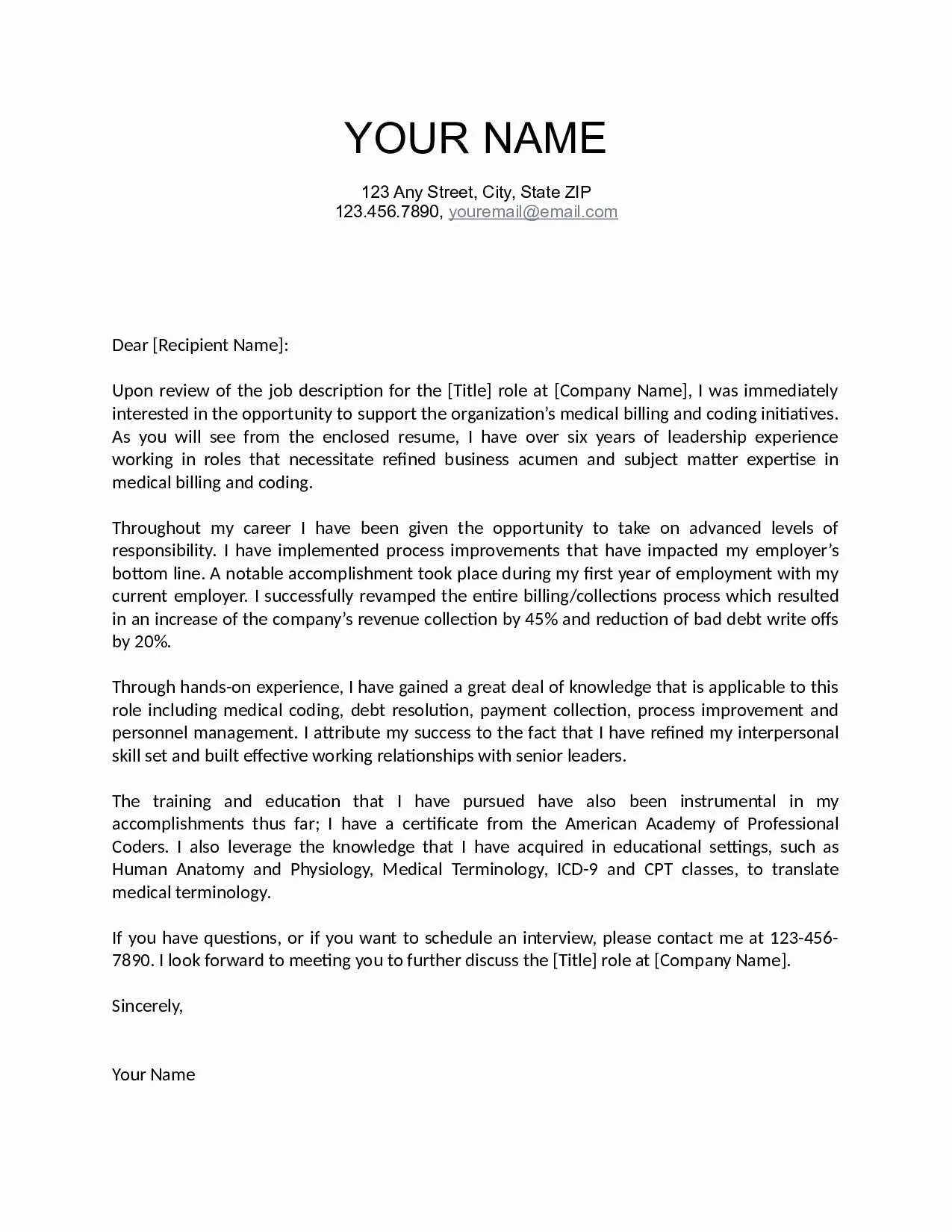
Your opening paragraph is your chance to capture the landlord’s attention. Start by stating the purpose of your letter – you are applying to rent the property. Then, briefly mention where you saw the listing and express your interest in the property. Be enthusiastic and positive, and you are already making a good impression. If there is something about the property that particularly appeals to you, mention it in this paragraph. This shows you have put thought into the application and are genuinely interested in the property.
Your Qualifications
This is the core of your cover letter, where you detail your qualifications as a potential tenant. Highlight your financial stability, employment history, and rental history. Provide the information the landlord needs to assess your ability to meet your rental obligations. You can state your monthly income, your current employment, and how long you have been employed there. This part of your cover letter will help landlords determine if you are responsible and reliable.
Employment and Income Information
Provide details about your employment, including your current job title, company name, and length of employment. Briefly describe your responsibilities and any relevant achievements. State your monthly income, and emphasize your ability to comfortably afford the rent. If you have multiple income sources, mention them to strengthen your financial profile. A steady income demonstrates financial stability.
Rental History
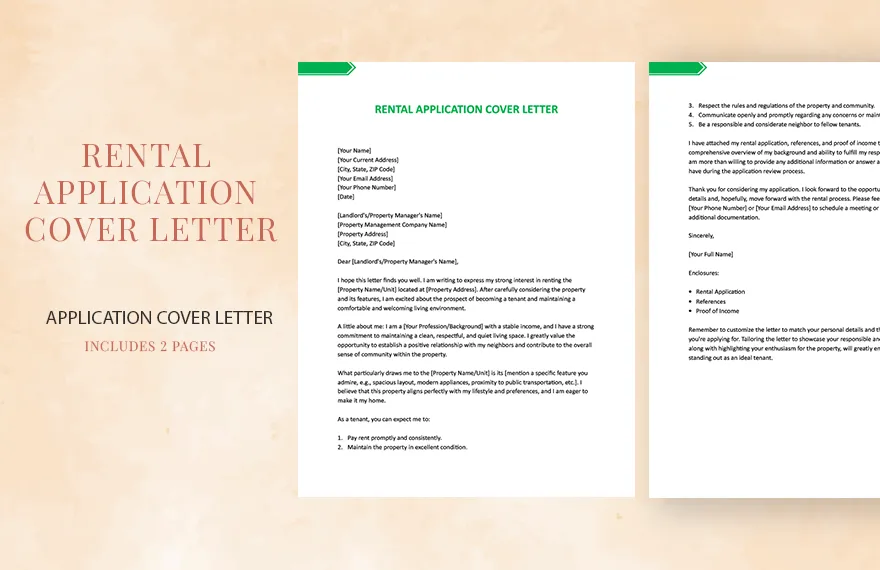
Include your rental history, including the names of your previous landlords and their contact information. State how long you rented from each landlord and whether you paid rent on time. If you have references from previous landlords, mention this in your letter. This will provide the landlord with a picture of your reliability as a tenant. Mention any positive relationships you have had with previous landlords.
Personal References
Include contact information for personal references who can vouch for your character. This can include friends, colleagues, or anyone who can speak to your responsibility and reliability. Provide their full names, phone numbers, and email addresses. This will give the landlord additional assurance. Inform your references that they may be contacted.
Expressing Your Interest and Closing
Reiterate your interest in renting the property and thank the landlord for their time and consideration. Express your enthusiasm for the opportunity to live there and state that you are eager to hear back from them. Reiterate your contact information and mention your availability for a viewing or interview. Conclude your letter with a professional closing, such as “Sincerely” or “Best regards,” followed by your full name.
Formatting and Presentation Tips
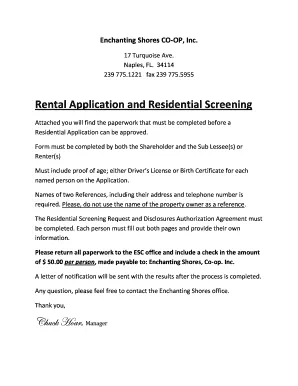
Keep It Concise
A cover letter should be no more than one page long. Landlords are busy, and they don’t have time to read lengthy documents. Keep your letter focused, relevant, and easy to read. Be direct and to the point, and avoid unnecessary details. Focus on the key information that will convince the landlord that you are the best candidate for the property. A concise and well-written letter is much more impactful than a long, rambling one.
Proofread Carefully
Typos and grammatical errors can create a negative impression. Before submitting your cover letter, carefully proofread it to ensure there are no mistakes. Use spell-check and grammar-check tools, but also read the letter aloud to catch any errors you may have missed. Consider having a friend or family member review your letter for a fresh perspective. A polished and error-free cover letter demonstrates your attention to detail and professionalism.
Use a Professional Tone
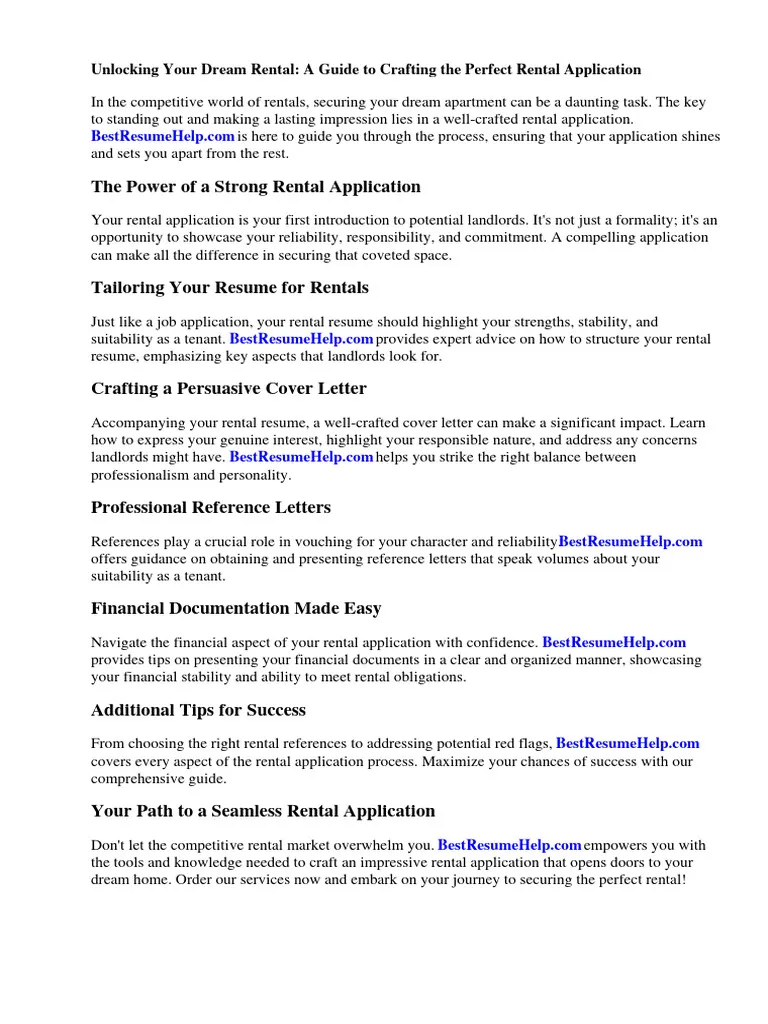
Maintain a professional and respectful tone throughout your cover letter. Avoid slang, informal language, and overly casual expressions. Use formal language and a respectful tone to create a positive impression. Avoid being overly familiar. If possible, address the letter to a specific person, such as the landlord or property manager, using their name and title. A professional tone is vital for communicating your ability to handle the responsibilities of a rental agreement.
Examples of Effective Cover Letter Content
Emphasizing Timely Payments
Highlight your history of timely payments. State that you have always paid your rent on time and have no history of late payments. If you have a strong credit score, mention that as well, as it indicates your financial responsibility. If you can, include a reference from a previous landlord confirming your history of on-time payments. This will help convince the landlord that you are a responsible tenant.
Mentioning Prior Landlord Testimonials
If you have positive testimonials from previous landlords, be sure to include them in your cover letter. This will add credibility and provide the landlord with external validation of your reliability and responsibility. Include a direct quote from a previous landlord that emphasizes your positive qualities. If possible, include the contact information of the landlord who provided the testimonial so the potential landlord can verify the information.
Highlighting a Stable Employment History
Highlighting a stable employment history can build confidence with the landlord. Describe your current job, including your job title and the duration of your employment. If you have been employed at the same company for a long time, highlight this, as it shows that you are stable and reliable. A long-term work history demonstrates that you have a steady income and are likely to be able to afford the rent. If you have a history of promotions or positive performance reviews, be sure to mention them.
Common Mistakes to Avoid
Typos and Grammatical Errors
Typos and grammatical errors can create a negative impression. A cover letter filled with errors demonstrates a lack of attention to detail. Before submitting your cover letter, take the time to proofread it carefully. Make sure to check spelling, grammar, and punctuation. Read it aloud, and have a friend or family member review it. A well-written and error-free cover letter shows that you are serious and professional.
Being Dishonest or Exaggerating
Avoid being dishonest or exaggerating in your cover letter. Landlords often verify the information you provide in your application. Lying can result in your application being rejected, and it could even lead to legal consequences. Instead of making false statements, focus on highlighting your strengths and presenting yourself honestly. Always be truthful and transparent about your qualifications and experience. Transparency builds trust and helps the landlord make an informed decision.
Failing to Personalize the Letter
Failing to personalize the cover letter can reduce your chances of success. A generic letter that could be sent to any landlord shows a lack of interest in the specific property. Take the time to research the property and landlord, and tailor your letter to their needs. Mention specific aspects of the property that appeal to you and express your genuine interest in renting it. Tailoring your letter will show that you are genuinely interested in the property.
Finalizing and Submitting Your Letter
Before submitting your rental application cover letter, review all the information. Ensure your contact details are correct, and all information is accurate and up-to-date. Make sure the letter is well-formatted, free of errors, and easy to read. If you are submitting an application online, save your cover letter as a PDF file, as it is easily accessible. Then, attach your cover letter to your rental application, and submit it promptly. Follow up with the landlord to confirm that they have received your application. A well-prepared and submitted cover letter can go a long way in securing your dream rental.
